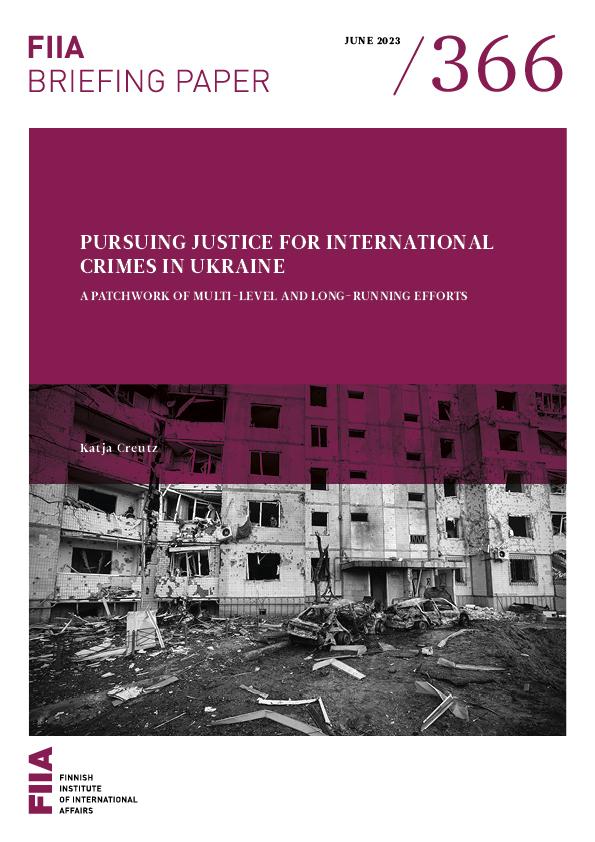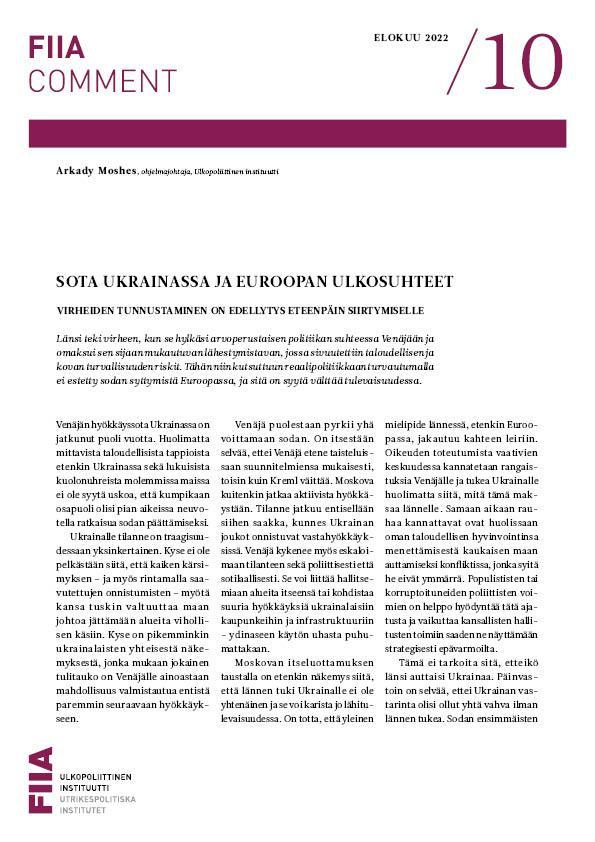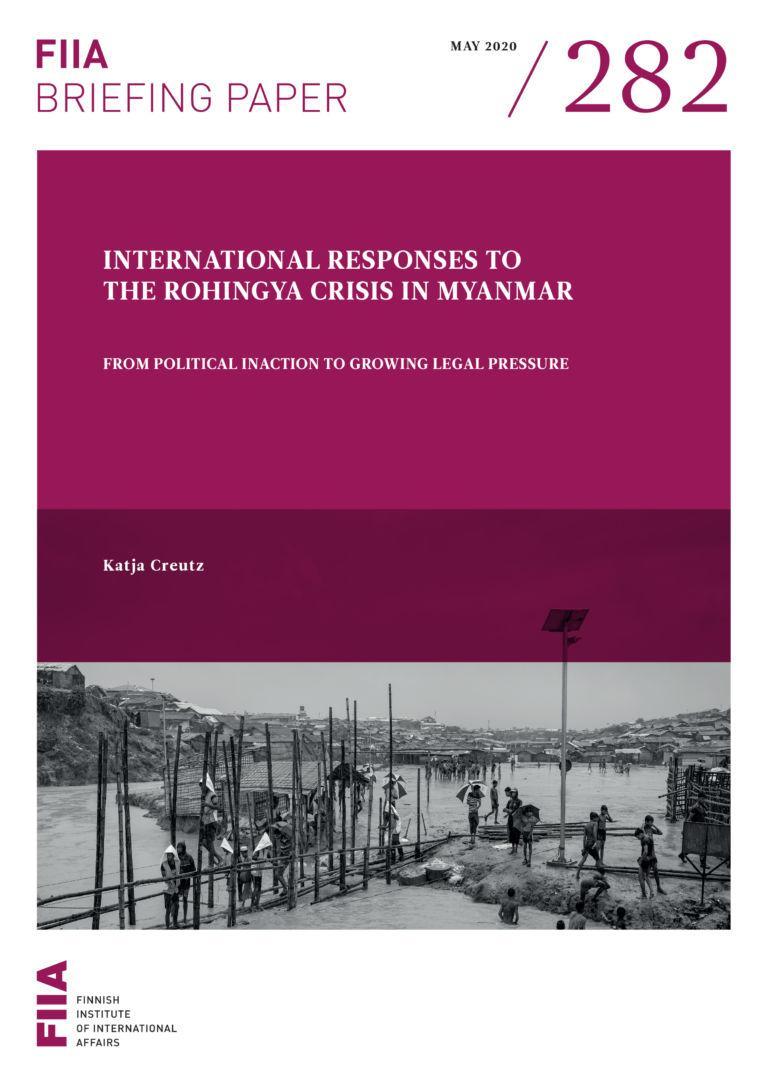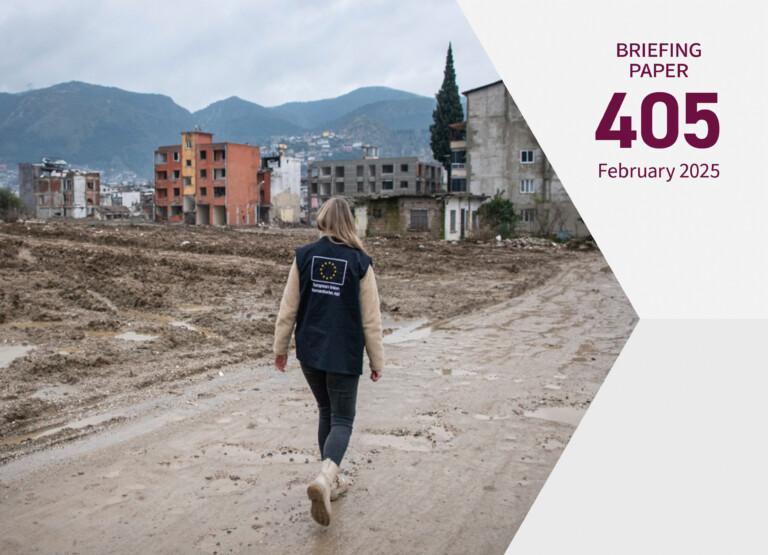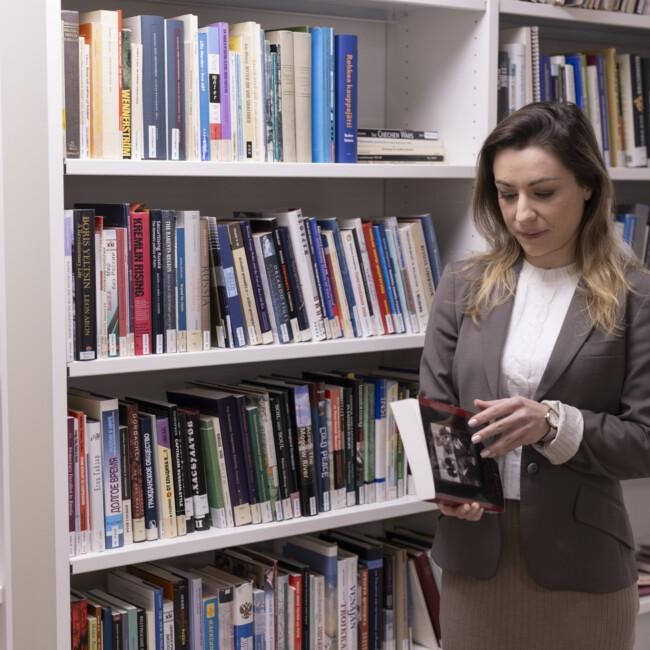
Venäjän hyökkäys Ukrainaan käynnisti keskustelun siitä, miten hyökkäysrikosta ja Ukrainassa tehtyjä sotarikoksia tulisi käsitellä kansainvälisessä oikeudessa. Ei kuitenkaan ole olemassa yksittäistä instituutiota, joka kykenisi käsittelemään kaikkia Ukrainassa tapahtuneita kansainvälisiä rikoksia.
Ukraina on raportoinut ja dokumentoinut kymmeniä tuhansia väitettyjä sotarikoksia, joista osan maan oikeuslaitos käsittelee itse. Tapausten valtavan määrän vuoksi kansainväliselle avulle on kuitenkin tarvetta. Myös kansainvälinen rikostuomioistuin ICC tutkii väitettyjä sotarikoksia.
Kansainvälinen yhteisö on jakaantunut suhtautumisessaan hyökkäysrikoksen tutkimiseen ja siitä syyttämiseen. Koska ICC:llä ei ole tässä tilanteessa toimivaltaa tuomita hyökkäysrikoksesta, eurooppalaiset valtiot ajavat ad hoc ‑tuomioistuimen perustamista. Valtaosa maailman valtioista, etenkin monet globaalin etelän maat, ei kuitenkaan ole tukenut aloitetta.
Keskustelu parhaasta tavasta käsitellä Venäjän hyökkäysrikoksia jatkuu. Pohdittavana on useita ongelmallisia seikkoja eri vaihtoehtojen poliittisesta mielekkyydestä valtionjohtajia suojaavaan immuniteettiin.
Introduction
Russia’s full-scale aggression against Ukraine as of February 2022 has violated, and continues to violate, fundamental rules of international law. Besides breaching the rules on the use of force and Ukraine’s territorial integrity that are fundamental to the UN Charter, norms of international humanitarian law as well as international human rights law have been violated in both a systematic and a widespread manner.
Unprecedentedly, the discussion on how to address international crimes committed in and against Ukraine started as early as the first week of the war. Since then, several plans, initiatives and investigations have been launched to deal with either alleged war crimes or the crime of aggression. While some of these efforts involve existing institutions, other initiatives on how to seek justice are more unsettled. Furthermore, the distinction between different efforts to achieve justice may seem unclear.
This Briefing Paper presents and discusses accountability options featuring in the international debate on how to deal with international crimes – particularly war crimes and the crime of aggression – committed by Russians in and against Ukraine. The exploration mainly concerns institutional efforts to ensure individual criminal responsibility under international law, which means that the focus will be on national prosecutions, the International Criminal Court (ICC), and a potential ad hoc tribunal.
Due to jurisdictional issues and matters pertaining to immunities of heads of state, the discussion will start with war crimes, after which the crime of aggression will be pondered. Both categories of crime will be analysed from the perspective of immunities under international law, legitimacy, and feasibility, in addition to the political side of pursuing them. The Briefing Paper will also address the less visible avenue of state responsibility, which constitutes an important part of the overall set of mechanisms that can help achieve justice for the Ukrainians and the state of Ukraine. Finally, the paper will conclude with a general discussion on the repercussions of the pursuit of accountability for international law and politics, both now and in the future.
Prosecuting war crimes: a patchwork of multi-level efforts
At an early stage, the Russian aggression against Ukraine revealed the complete disregard for abiding by the laws of war demonstrated by the Russian political and military leadership, and in consequence by Russian troops. The first signs of violations came early on in the conflict, spurring the ICC to open an investigation as early as March 2022 into alleged crimes committed throughout the Ukrainian territory. Besides the work of the ICC, Ukraine has itself pursued justice by indicting dozens of Russian soldiers for alleged war crimes. These ongoing, parallel pursuits of justice are uncontroversial for the most part, and feature few principled or practical problems out of the ordinary.
National prosecutions
One of the basic principles of international criminal justice is its complementary nature. This means that international crimes should first and foremost be prosecuted nationally, and only at the international level due to unwillingness or incapacity. Ukraine has exercised its powers to investigate and prosecute alleged crimes before its national courts, whereas Russia has failed to do so for its part. Moreover, it seems unlikely that Russia’s current regime would ever do so.
The Office of the Prosecutor General in Ukraine, which is responsible for the country’s work with respect to war crimes, has a website, and even an app, where alleged war crimes can be reported. This collected information is then made available for national and international prosecutions over time. By 2 May 2023, the office had reported 81,531 war crimes,[1] with 25 judgments being delivered by Ukrainian courts so far.[2] These convictions pertain to the torture of Ukrainian soldiers, the shelling of residential buildings and pillaging, among other crimes. The first sentence by Ukrainian courts in a war crimes case was delivered in May 2022 against a Russian sergeant, who was sentenced to life imprisonment for shooting a civilian. His sentence was subsequently reduced in a court of appeals to 15 years in prison.[3]
Some scholars have expressed concerns about whether the Ukrainian courts are up to the task of investigating and prosecuting war crimes and crimes against humanity.[4] To begin with, several Ukrainian courts have been forced to move their operations from Russian-occupied parts of the country to Ukrainian-controlled territory. As in conflict areas in general, gathering evidence and apprehending suspects is challenging. Moreover, the Ukrainian court system has been described as corrupt, and it has been discussed whether it can live up to the applicable fair trial requirements.[5] It can also be questioned whether a war-torn country is the right place to conduct a war crimes investigation and prosecution to begin with.[6] According to reports, defence lawyers of the accused have been harassed, the sentencing has been harsh, and the workload seems massive.
Ukraine is not alone in addressing the huge number of alleged war crimes. A large group of Western states have promised assistance, as has the ICC, but the most important development has been the establishment of a so-called Joint Investigation Team (JIT) consisting of national authorities from Ukraine, Estonia, Lithuania, Latvia, Poland, Romania, and Slovakia. The JIT is supported by the European Union Agency for Criminal Justice Cooperation (Eurojust).
The European Union (EU) has provided important support for Ukraine’s efforts to achieve accountability, as has the United States, which the JIT cooperates with in its investigation and prosecution efforts. However, irrespective of all the accumulation of help for and in Ukraine, there are limits to what the national courts can do. For example, they cannot prosecute Russian President Vladimir Putin for war crimes – or any other international crime for that matter – due to the immunities of a sitting head of state.
The ICC
The first-ever permanent court of international criminal justice, the ICC, has opened its own investigations regarding war crimes committed in Ukraine. Neither Ukraine nor Russia are state parties to the ICC, but due to the extension of a previous Ukrainian declaration that gave the ICC jurisdiction to investigate alleged crimes committed by Russia in the so-called Maidan uprising from November 2013 to February 2014, the ICC also has jurisdiction regarding potential crimes committed after 24 February 2022. This suffices for the ICC to act, as the crimes perpetrated by the Russian military have occurred on Ukrainian territory.
Multiple state parties to the ICC have also referred the Ukrainian case to the ICC, which meant that its Office of the Prosecutor (OTP) expedited the launch of investigations into the situation. This means that as of 2 March 2022, an investigation into the situation in Ukraine was commenced less than two weeks after the Russian full-scale aggression had started. Approximately one year later, the investigation resulted in arrest warrants for Russian President Putin and Commissioner for Children’s Rights Maria Lvova-Belova for ‘the war crime of unlawful deportation of population (children) and that of unlawful transfer of population (children) from occupied areas of Ukraine to the Russian Federation, in prejudice of Ukrainian children’.[7] This decision is important as under the ICC Statute a person’s official capacity does not hinder the ICC from exercising its jurisdiction over the person in question – a rule that major powers have failed to unequivocally accept. While Russia has condemned the indictments and concomitant arrest warrants, they have allegedly caused nervousness among the Russian elite.
The prospects of making Putin and Lvova-Belova appear before the ICC in The Hague seem remote. The ICC lacks its own police force, as it relies on its 123 state parties to cooperate in order to bring suspects to the Court. While the obligation of ICC state parties to arrest President Putin — should he travel to such a country— remains rather uncontroversial, the prospects for such action are unlikely in the near future. Many states prefer not to be put in a position where they have their backs against the wall: for example, South Africa urged President Putin to attend the annual BRICS meeting in Pretoria in May 2023 virtually instead of in-person. The ICC’s arrest warrant nevertheless means that Putin must consider where he travels, and that he is becoming increasingly isolated. Moreover, there is no time limit for the prosecution of these crimes.
It is also noteworthy that the ICC Statute does not allow for in absentia trials, and that international criminal cases take a long time to pursue. For example, it is not unheard of for cases to last over a decade from the first indictment to the ultimate judgment.[8] The prospects for justice are thus more long-term, and build upon the possibility of regime change in Russia. Nor should one forget about the many functions of international criminal justice. Besides punishing perpetrators, it has an important signalling function and, some claim, even a preventive one. While other heads of state, such as Charles Taylor of Liberia and Slobodan Milosevic of Serbia, have been prosecuted, the indictment against President Putin is remarkable as it is the first time ever that an international criminal court is seeking to apprehend the leader of a permanent member of the UN Security Council.
A further constraint on the ICC is that while it has jurisdiction to prosecute Putin and his accessories for war crimes, the Court is not currently capable of prosecuting the crime of aggression. Yet many politicians and scholars alike consider it crucial to have the highest Russian leadership stand trial for violating the law on the use of force, which entails moving towards investigating and prosecuting the crime of aggression as well. While the ICC – with the so-called Kampala Amendments as of 17 July 2018 – can investigate and prosecute the crime of aggression for those state parties that have separately accepted the Court’s jurisdiction for the crime, the process is cumbersome and involves some political elements. In the absence of Ukrainian and Russian consent to be parties to the ICC, the UN Security Council could refer the case of aggression to the Court. Russia’s veto power in the Security Council nonetheless effectively prevents this.
Prosecuting the crime of aggression: a divided international community
The crime of aggression, which is a leadership crime, entails that the sovereignty, political independence and territorial integrity of a state is violated in a way which, according to Article 8 bis of the ICC Statute, constitutes a manifest violation of the UN Charter. It pertains only to the most serious and unlawful instances of the use of force, and was referred to as ‘crime against peace’ in the Nuremberg trials. Indeed, prosecuting President Putin for this crime would be more to the point, as it can be argued that no other international crimes would have been committed were it not for the aggression. Moreover, this particular crime provides a direct link to the Kremlin. As there is currently a legal vacuum when it comes to prosecuting Russia’s highest political and military leadership for the crime of aggression, some states argue for the creation of an ad hoc special tribunal to achieve this objective.
Western determination for an ad hoc tribunal
From the start, Russia’s actions against Ukraine have been referred to as a crime of aggression in different connections internationally. This holds true for relevant UN General Assembly (UNGA) resolutions addressing the situation, regional organisations such as the Council of Europe, as well as scholarly opinion. For example, practitioners, politicians, and legal scholars alike issued a Statement calling for the establishment of a special tribunal for the punishment of the crime of aggression against Ukraine early on in the conflict.[9]
However, it is noteworthy that not all states read the situation publicly in a similar fashion: while an overwhelming majority of UNGA member states have condemned Russia’s actions as aggression against Ukraine, major powers like China or India have abstained from voting in favour of condemning Russia’s actions, as have a number of other countries from the so-called Global South. In their view, condemning Russia’s actions would undermine the path towards finding a peaceful solution to the conflict. Moreover, international criminal justice is broadly perceived as a project of the West. Against this background, it is hardly surprising that efforts by Ukraine to introduce a UNGA resolution on accountability for the crime of aggression have found meagre support among the member states or even the Secretary-General. For example, the International Crisis Group, a transnational non-governmental organisation, has estimated that only approximately one-third of the members would support the creation of a tribunal for the crime of aggression.[10] There are also more future-oriented issues in terms of bringing Putin to trial: the United States has reportedly expressed concerns that a tribunal could impede ‘Washington’s ability to reach Putin in an emergency’.[11]
Western states, with Europe at the forefront, are nevertheless determined to pursue investigation and possible prosecution of the crime of aggression. The international core group that seeks prosecution of the crime of aggression is composed of circa 30 states, most of which belong to Ukraine’s allies from the EU.[12] While the core group seems focused on investigation and prosecution, there seems to be unclarity about how it should be handled. Different alternative routes feature in the discussion, but the most viable options are a special international tribunal, or one which works within the Ukrainian judicial system.
Although many states are still undecided on their preferences, concrete steps have been taken to ensure investigation and prosecution regarding the crime of aggression. One such step was the creation of the International Centre for the Prosecution of the Crime of Aggression (ICPA) in The Hague, which aims to collect and prepare evidence for future trials.
From a special tribunal to a hybrid one?
One of the explicit alternatives for prosecuting the crime of aggression has been the establishment of a special international tribunal. Such a tribunal could be established either through a multilateral treaty or, as suggested by some scholars, through a UNGA resolution, which would give the tribunal legitimacy. However, the lack of broad support for such an option makes it politically impractical. It would also assume that the UNGA is acting as a replacement for the constrained Security Council, in the spirit of the ‘Uniting for Peace’ resolution of 1950. There are nevertheless drawbacks to this choice: scholars have warned about its precedent-setting value, and the need to have a two-thirds majority of UNGA members behind such a course of action.[13]
In March 2023, the United States announced its preference for an internationalised tribunal dedicated to prosecuting the crime of aggression. Similar statements have also been made by the governments of the United Kingdom and Germany, as well as the G7 group. While the contours of such a tribunal remain open, it seems that the United States favours a hybrid tribunal within the Ukrainian judicial system, which incorporates elements of both national courts and international ones, benefitting from inter alia international judges and personnel, international financing, and international substantive law.
At this stage, there are nonetheless no clear-cut answers to how an internationalised tribunal would be set up, whether it would apply international or national criminal law, and how it would deal with head of state immunity. Such courts have, however, been utilised by the international community on several occasions when dealing with accountability for atrocity crimes. For example, they have been used in Cambodia, Sierra Leone, Kosovo, and Lebanon. President Volodymyr Zelenskyy has, however, strongly objected to any form of hybrid tribunal and has called instead for a full-fledged special international tribunal à la Nuremberg.
Bringing state responsibility out of the shadows
The public debate on Russia’s responsibility for its violations of international law in Ukraine has centred on international criminal justice. Yet all of the discussed international crimes also fall under the remit of state responsibility, which is the regime through which all violations of international law can be addressed – whether ‘ordinary’ or more ‘aggravated’ in nature.
Under international law, a state is considered legally responsible for breaches of its international legal obligations if the actions that constitute a violation can be attributed to the state, for example due to the performance of its state organs. Accordingly, besides pursuing justice through holding Putin, for example, individually criminally responsible before the ICC or a planned Special Tribunal, the state of Russia as a whole can be held responsible for the same actions and beyond. Thus, responsibility can be parallel: it can be both individual for a limited set of violations described as international crimes, and it can be statal.
There have been few outlines of how state responsibility can be pursued with regard to Russia. It seems that there is reluctance to resort to state responsibility as the war itself seems to be personified by President Putin, an illegitimate leader who arguably forces his population to wage war against Ukraine. Yet state responsibility is not devoid of merits as it can address system-level violations and provide reparation for the vast destruction the conflict has brought about – a factor repeatedly stressed by Ukraine’s President Zelenskyy.
One embodiment of state responsibility is Ukraine’s institution of proceedings against Russia before the ICJ in February 2022 for violating the Genocide Convention. According to Ukraine, Russia has misused the Genocide Convention by justifying its unlawful invasion with allegations of genocide in Luhansk and Donetsk. The ICJ, which is the principal judicial organ of the UN, as distinct from the ICC, implied with its order for provisional measures on 16 March 2022 that it has treaty-based jurisdiction to settle the matter. While Russia has refused to participate in the proceedings, numerous states, including Finland and many other EU member states, have intervened in the matter as non-parties to the dispute.
Another future-oriented potential course of action manifesting state responsibility could be the creation of a post-conflict claims commission to deal with reparation claims by companies, individuals, and potentially foreign governments. Claims commissions have been used historically to deal with reparations after conflicts and commotion, but also more recently, for example, in handling the aftermath of the US-Iran crisis in 1979, as well as Iraq’s attack on Kuwait in 1990–1991. There could be multiple benefits with a claims commission: it would enable compensation to be paid to individuals and companies in a balanced way; it would provide reparative justice without addressing criminality; it would be managed by a non-political body, and it would enable Russia in particular to demonstrate a commitment to peaceful co-existence and the rule of law.[14] The recent decision of the Council of Europe member states to create a register of damages with respect to Ukraine indicates that a claims commission may indeed be in the making.
Conclusions
Bringing Russian perpetrators to justice, irrespective of their rank, is an important but daunting joint task for Ukraine and the international community. The sheer scale of the war crimes is enormous, which poses a challenge for the Ukrainian national criminal justice system in the midst of a raging war.
While many states are supportive of Ukraine in its efforts, the highest Russian leadership must be tried before an international court, such as the ICC, due to immunities under international law. While the ICC has issued arrest warrants for President Putin and Commissioner of Children’s Rights Lvova-Belova for war crimes, the prospects of the leader of one of the world’s major powers standing trial in The Hague remain bleak. However, the processes of international criminal justice are long, and potential windows of opportunity may open over time – especially if the regime in Russia were to change.
The question that remains open is how to address the crime of aggression that President Putin, together with a number of other political and military leaders, has committed when attacking Ukraine. While issues of jurisdiction, immunities, enforcement and legitimacy come into play, Western states consider it vital not to let impunity reign in this regard. What happens with respect to the crime of aggression is crucial for the future of international criminal justice, but also more broadly for the rules-based order as such. The latter can, however, also take advantage of mechanisms that point to Russia’s responsibility as a state. A claims commission modelled upon previous examples could handle the mass claims generated by the widespread destruction inflicted by the war. All in all, multiple efforts by a range of institutions and partners over a longer period of time will be required before justice is served. This will be accentuated even further if charges of genocide become more vocal.
Endnotes
[1] Office of the Prosecutor General in Ukraine (2023). https://www.gp.gov.ua/.
[2] Sly, L. (2023) “66,000 War Crimes Have been Reported in Ukraine. It Vows to Prosecute Them All”. https://www.washingtonpost.com/world/2023/01/29/war-crimes-ukraine-prosecution/.
[3] AP News (2022, July 29) “Ukrainian Court Lowers Russian Soldier’s War Crimes Sentence”. https://apnews.com/article/russia-ukraine-kyiv-war-crimes-sentencing-1590d0aa9c36870925304fbab5cfba47.
[4] Nuridzhanian, G. (2022) “Prosecuting War Crimes: Are Ukrainian Courts Fit to Do that?”. https://www.ejiltalk.org/prosecuting-war-crimes-are-ukrainian-courts-fit-to-do-it/.
[5] Ambos, K. (2022) “Ukrainian Prosecution of ICC Statute Crimes: Fair, Independent, and Impartial?”. https://www.ejiltalk.org/ukrainian-prosecution-of-icc-statute-crimes-fair-independent-and-impartial/.
[6] Bardet, C. (2022) “Ukraine: The Risk of Judging War Crimes During War”. https://www.justiceinfo.net/en/93059-ukraine-risk-judging-war-crimes-during-war.html#utm_source=twitter&utm_medium=reseaux-sociaux.
[7] ICC (2022) “Situation in Ukraine”, ICC-01/22. https://www.icc-cpi.int/situations/ukraine.
[8] Galbraith J. (2009) “The Pace of International Criminal Justice”. Michigan Journal of International Law, vol. 31, pp. 80–155.
[9] “Statement Calling for the Creation of A Special Tribunal for the Punishment of the Crime of Aggression Against Ukraine” (2022). https://www.eurointegration.com.ua/files/a/a/aad78ad-combined-statement-and-declaration-1-.pdf.
[10] International Crisis Group (2023) “A New Court to Prosecute Russia’s Illegal War?”. https://www.crisisgroup.org/global-ukraine/new-court-prosecute-russias-illegal-war.
[11] Shuster, S. (2023, March 30) “Inside Ukraine’s Push To Try Putin for War Crimes”, Time, https://time.com/6266991/ukraine-push-putin-war-crimes/.
[12] International Crisis Group (2023).
[13] Corten, O. and Koutroulis, V. (2022) “Tribunal for the Crime of Aggression against Ukraine – A Legal Assessment”. https://www.europarl.europa.eu/RegData/etudes/IDAN/2022/702574/EXPO_IDA(2022)702574_EN.pdf.
[14] Gentilli, R. (n.d.) “Ukraine Options Paper. A Russia-Ukraine Commission after the Armed Conflict”. https://www.lcil.cam.ac.uk/sites/www.law.cam.ac.uk/files/images/www.lcil.cam.ac.uk/ukraine/anon_a_russia-ukraine_claims_commission_after_the_armed_conflict_web_version.pdf.


